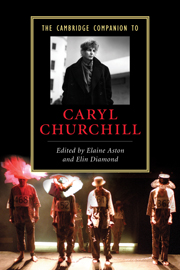Book contents
- Frontmatter
- 1 Introduction: on Caryl Churchill
- 2 On feminist and sexual politics
- 3 On owning and owing: Caryl Churchill and the nightmare of capital
- 4 On the challenge of revolution
- 5 On text and dance: new questions and new forms
- 6 On Caryl Churchill’s ecological drama: right to poison the wasps?
- 7 On performance and selfhood in Caryl Churchill
- 8 On Churchill and terror
- 9 On collaboration: ‘not ordinary, not safe’
- 10 On Churchill’s influences
- Select bibliography
- Index
5 - On text and dance: new questions and new forms
Published online by Cambridge University Press: 28 March 2010
- Frontmatter
- 1 Introduction: on Caryl Churchill
- 2 On feminist and sexual politics
- 3 On owning and owing: Caryl Churchill and the nightmare of capital
- 4 On the challenge of revolution
- 5 On text and dance: new questions and new forms
- 6 On Caryl Churchill’s ecological drama: right to poison the wasps?
- 7 On performance and selfhood in Caryl Churchill
- 8 On Churchill and terror
- 9 On collaboration: ‘not ordinary, not safe’
- 10 On Churchill’s influences
- Select bibliography
- Index
Summary
'Playwrights don't give answers, they ask questions. We need to find new questions, which may help us to answer the old ones or make them unimportant, and this means new subjects and new form.' Caryl Churchill builds on this assertion from 1960 by stressing the need to use the theatre medium more fully, an ambition pursued subsequently with a passion clearly in evidence in the series of collaborative projects she undertook between 1986 and 1997. In the performances to be considered, A Mouthful of Birds (1986), Fugue (1988) made for television, The Lives of the Great Poisoners (1991), The Skriker (1994) and Hotel (1997), Churchill included dance and movement choreographed by Ian Spink and it is this particular interweaving of text and dance that is the focus of this chapter. How, for instance, can simultaneity of action or the specific temporal and spatial qualities of dance contribute to Churchill's evocation of such elusive, yet crucial experiences as remembering and forgetting? In different ways issues of memory permeate these plays as recollection, re-writing of narrative, intentional forgetfulness and desire for memory retention seep into the more obviously dramatic thematic concerns of the supernatural, violence, transformation, poisoning and death. Churchill's desire to share the stage/ screen with a dance-based performance maker over the course of five performances suggests a sustained preoccupation with the way that dance, in the hands of Spink, could contribute to her general drive for new forms to explore persistent as well as new questions.
- Type
- Chapter
- Information
- The Cambridge Companion to Caryl Churchill , pp. 71 - 87Publisher: Cambridge University PressPrint publication year: 2009
- 2
- Cited by

